In 2023, Africa witnessed a series of disasters due to the change in weather and climate patterns. Flash floods wreaked havoc in Libya, while Morocco was struck by an earthquake. Algeria faced wildfires during a heatwave, and Mozambique bore the brunt of Cyclone Freddy, resulting in extensive damage and displacement. As we stand at the intersection of environmental crisis, it is time to delve into the impacts of climate change and heed a call to action. This article aims to unravel the multifaceted impact of climate change, exploring its roots, the consequences, and the imperative for collective action for Africa.
In 2023, Africa witnessed a series of disasters due to the change in weather
and climate patterns. Flash floods wreaked havoc in Libya, while Morocco was
struck by an earthquake. Algeria faced wildfires during a heatwave, and
Mozambique bore the brunt of Cyclone Freddy, resulting in extensive damage and
displacement.
As we stand at the
intersection of environmental crisis, it is time to delve into the impacts of
climate change and heed a call to action. This article aims to unravel the
multifaceted impact of climate change, exploring its roots, the consequences,
and the imperative for collective action for Africa.
Climate is the average weather condition of a
geographical area over a long period of time. The long pattern of temperature,
precipitation, humidity and other atmospheric conditions influences the type of
ecosystems that thrive in a given area and significantly impacts the overall
environment. Climate changes are a consequence of human activities disrupting
the delicate balance of the Earth’s atmosphere.
Economically, the toll is staggering as
rebuilding after a climate-related disaster drains resources, exacerbating
poverty and hindering sustainable development. Its impacts are extremely felt
by vulnerable communities and regions such as Africa.
Records
of some disasters due to Climate Change in Africa
Impact
of climate change on other species
Mitigation
and Adaptation Strategies
Public awareness seminars, educational
campaigns, and community-driven initiatives are key to sparking this
understanding. Africa is particularly vulnerable to the effects of climate
change, despite contributing the least to the problem. There is a need to equip ourselves with
knowledge, share sustainable practices, and hold each other accountable for
positive change. Small actions taken by individuals can collectively create a
mighty wave of impact, from reducing waste to conserving energy, adopting
eco-friendly practices, and advocating for stronger climate policies, every
action counts.
In conclusion, the urgency to address climate
change is paramount, and the call to action must be met with a sense of
responsibility and commitment. The long-term consequences of climate change,
from extreme weather events to the loss of biodiversity, necessitate a
collective effort to mitigate its impact and adapt. As we confront the
challenges of climate change, let us remember that our actions today shape the
world for future generations. By embracing sustainable practices, fostering
awareness, and advocating for change, we can contribute to a healthier, more
resilient climate that stands the test of time.
As we navigate the turbulent seas of climate
change, the call-to-action rings louder than ever. The consequences of climate
change are too terrible. It is a collective responsibility that goes beyond
borders and thoughts, let us all commit to safeguarding the climate for the now
and future generations by actively engaging in climate action in our very own
way as individuals, communities, industries and countries by creating awareness
and spark conversations that lead to meaningful change in our activities.
Together, as agents for better climate, we can forge a path toward a healthier
and more sustainable planet for now and future generations.
Conflict Of Interest
The views and opinions expressed in this article are those of the author, and they do not purport to reflect the policies, opinions, or views of the AfroScience Network platform.
Disclaimer
This article has not been submitted, published or featured in any formal publications, including books, journals, newspapers, magazines or websites.
Be the first to comment
Please login to comment








